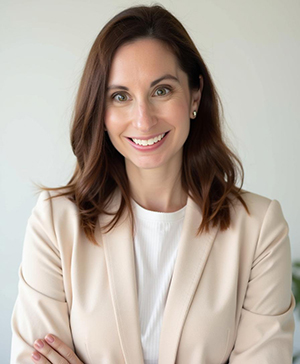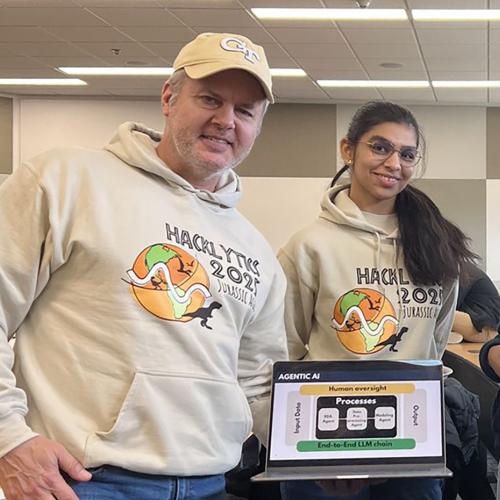Preparing for Your Career's Next Chapter
Practical strategies to rebrand, network, and stand out in today’s competitive job market

For those already in the workforce, upskilling or reskilling often yields new career opportunities, whether it’s a promotion or a job in a different field. As a working professional, if you've already been in the workforce for some time, navigating the process can often feel daunting.
However, there are many resources to help you create a polished resume and cover letter, and focus on your interview and networking skills. With them, you can be on your way to marketing yourself effectively in a competitive job landscape.
Refresh Your Resume
Resume writing isn’t like Mad Libs — you are unique, and so are your talents! As you begin reworking your resume, lean into your leadership or management expertise, and share both practical, on-the-job experience as well as any new educational opportunities you have taken advantage of since you entered the workforce. Also, be mindful of what you bring to the table in terms of durable or human skills, as 76% of job postings in 2025 are requesting at least one durable skill — up from 64% in 2021.

Megan Elrath, a graduate online career services manager, serves as a dedicated career services liaison for Georgia Tech FlexStack students and is a certified resume writer. She encourages individuals who have returned to school to seek out offerings available to them through their current or former institutions, especially if it’s been some time since they were job hunting.
For example, for FlexStack learners, she has created a hub that houses, among other things, a series of pre-recorded webinars available to students whenever they are ready to start working on updating their documents. “These students are busy,” she says. “They have multiple things going on, and our self-service assessment is a great way for them to get started.”
Elrath also encourages taking advantage of online assets, whether they are program-specific or generalized. She notes there are different strategies to keep in mind when building a resume.
For example, creating a master resume containing all of your experience and education can be beneficial because you can use it to create customized documents for specific positions. Making sure the document is saved as a PDF using easy-to-read fonts and is properly labeled are other things to consider.
And if one-on-one help is needed, reaching out to career service professionals and resume writers can be highly beneficial.
“We can help you pull out some of those more transferable skills to help you leverage that experience to be successful in your next position,” Elrath says.
Craft a Compelling Cover Letter
While a resume outlines skills and experiences, a cover letter is a way to connect those dots with a potential employer. This document allows you to share information about your experiences, whether through years in the workforce, military, volunteer service, or even parenting — and offers you a chance to explain why your skills matter in a new or different role.
When crafting a cover letter, make sure you tell a clear story about your career journey and how your background can meet the needs of your employer. The letter is also an opportunity to demonstrate your personality and express enthusiasm.
Once drafted, share it with members of your network for feedback and editing. This is a good time to ask members of your personal board of directors for any valuable strengths or attributes they see in you that you may have missed.
Go Beyond the Paperwork
While drafting and editing your professional documents is an integral part of job hunting, there is much more to the journey than that.
Elrath has made a point to create weekly office hours for FlexStack students so they can come together to discuss any concerns they may have on the job front.
“I open up a weekly Zoom room,” she says, “and learners can drop in to ask any career services-related questions they have. In a venue where more than one learner can attend, it often sparks conversations around similar concerns. The goal of the office hours is for several students to attend, and maybe have similar concerns so we can have conversations with each other.”
Other ways adult learners can think holistically about marketing themselves in the workforce include practicing interviewing techniques through mock interviews, which can help build confidence and clarity.
“Ultimately, we want learners to feel confident about telling their stories in such a way that it’s almost like branding themselves so that they can go out and be successful and add value to employers,” Elrath says.
Once you have your “brand,” you can expand your LinkedIn profile to showcase your skills and begin tapping into networking opportunities, job boards, or resource hubs, which many institutions, including Georgia Tech, offer to their students.
Lifetime Learning is a Strength
Adult learners bring a wealth of experience and real-world lessons through their years in classrooms and workplaces, and being a lifetime learner helps add tools to your skillset. Courses taken, credentials earned, and completed training are all intentional investments in your career that show a willingness to embrace change. It is important to be proud of your efforts and showcase them accordingly.
As you begin your job hunt, remember you are not starting from scratch — you are building on years of knowledge and perspective. By updating resumes, focusing on strategic learning opportunities, and taking advantage of career services support, you can articulate your value in the workplace and seize new opportunities.

